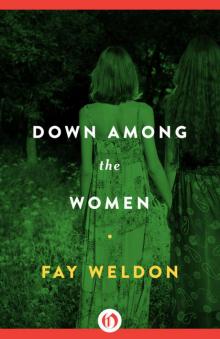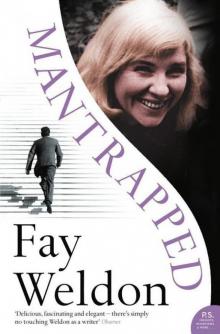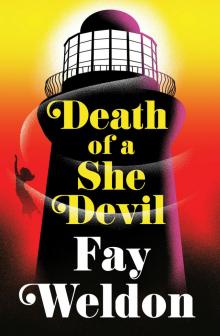- Home
- Fay Weldon
Before the War Page 16
Before the War Read online
Page 16
They wondered why the English milady, who had been meant to arrive with the young couple, had not turned up to be with her pregnant daughter when the time came, and why the English husband with the big car had left her alone at such a time, but who knew how the minds of foreigners worked? They had paid good money for their quarters, been perfectly pleasant, and caused no trouble, at least until now. The Bielers would charge extra for soiled sheets and towels.
Vivvie smiled when she could and groaned when she couldn’t, and thought it was like her monthly pains but rather more so. They kept putting brandy to her lips and an infusion of angelica root and she sipped and let the women’s voices pass over her. There was a slight problem when the head wanted to come through and couldn’t, but Vivvie’s body, which seemed to have very little to do with her any more, decided to thrust it out, and did. The women seemed very excited and pleased. A little girl, perfectly formed. Vivvie asked what she was called before falling asleep. Angelica infusion can be quite strong.
‘Stella,’ said Frau Bieler, surprised, but pleased enough to be asked. In England, it seemed, the midwife named the baby. Stella meant star. The baby was a lovely little thing, its head quite unsquashed, as could happen if a labour was quick. The afterbirth slipped out and was wrapped in paper and burned. The baby was washed, swaddled and put to the breast. Frau Bieler and Greta had coffee and cake.
Vivvie woke and groaned again and Greta checked to make sure all was well. Then she cried out in alarm. An infant foot had appeared from between the massive thighs. Twins, and this one a breech birth. Greta ran round and called in Frau Auerbach from next door to help. They gave Vivvie more infusion from the angelica root potion. Frau Auerbach swore by Frauenmantel and Alraun or mandrake, so they boiled some of that as well.
A thigh appeared. Vivvie shrieked. Nothing happened. Vivvie fainted and couldn’t push. Greta said, ‘I’ve done this with goats,’ put an arm in and pulled, but not too hard so as to break anything. Another leg burst out and then the body – a girl – and finally the head. A really large baby. Twins they might be, but not identical. This one even played dead for an anxious moment – probably the effects of the mandragora root, which can render a person sleepy – then breathed, lived, opened its mouth and announced its arrival with a cry of rage.
Frau Auerbach was given the privilege of naming the newcomer and chose to call her Mallory, a name which signifies unfortunate. Because this she was. Mallory too was washed, swaddled and put to the breast, but tended to bite while she sucked, having been born with one front tooth already formed. Stella sucked easily, sweetly. Mallory never elicited the same cries of enthusiasm as Stella. She did not smile for quite some weeks, unlike the elegantly formed Stella, and kept her initially squashed head and frowning brow for quite some time. But at least both babies were born alive and healthy, and both were to live into the next century. Mallory was always to have a slight limp because her swaddling, done by Frau Auerbach in the Alpine fashion – swaddling prevents the infant, accustomed to the confines of the womb, from startling itself by its own sudden movements – was a little too tight and resulted in a degree of hip dysplasia. Indeed, she was so busy doing it she did not realise that part of Mallory’s afterbirth remained in Vivvie’s womb. None of these women, after all, were trained in any way.
Frau Bieler swaddled Stella, and did it more loosely and so the baby was to walk easily and dance freely all her life.
When in later life Stella consulted their horoscopes (how Mallory sneered) she came back and told her sister that they were Gemini butterflies. Mercury in Gemini in the first house.
‘Oh,’ said Mallory, ‘then I suppose I’m the vulgar cabbage white and you’re the lovely wood white.’ They were both in their twenties at the time and living in what the army had left them of Dilberne Court. The cabbage white was wreaking havoc in the vegetable garden. The wood white could turn Dilberne woods on a June evening into a shimmering, magic grotto. Dark green shadows and a host of pale lacy dancers. Mallory spoke without bitterness. Like her mother, she was brave in facing harsh truths. She accepted the injustice to which we are all born. That’s what comes of having your transiting moon making a square to the planet Pluto – like mother, like child – if that’s the kind of thing you believe in. Your author half does, if only because it comes in so useful when writing novels.
Anyway. On, on. Poor Vivvie has to die, and all Adela’s fault.
Sunday Morning, July 6th 1923. Barscherau
The Bentley pulled up outside the Gasthaus Post the next morning, with Adela in her mink in the passenger seat, and Dr Walker and three of Adela’s cases in the back. Another five filled the boot, which male Bentley owners complained was unnecessarily large but women passengers seldom did. The suitcases were calf skin and from Aspinal. Adela did not travel light. Sherwyn had hoped to get back to Vivvie by Saturday evening but one way and another there had been delays. Adela had decided she might as well move in with the young couple in Barscherau since the food was reasonable, and the Keifersfelden landlady was beginning to look at her oddly – heaven knew why – and Dr Walker must take a preliminary look at Vivvie and bring up his twilight sleep equipment and leave it – ‘a special bed with straps and cuffs, why? A simple birth! But she supposed he knew what he was doing!’ so they might as well take the good doctor along for the consultation, and perhaps dear Sherwyn wouldn’t mind dropping him back afterwards and she could have a good chin-wag with Vivvie – this business of her looking after the baby was a nonsense – tittle tattle about shot gun weddings would do Sherwyn’s literary career no good at all – and then Dr Walker had to be persuaded yet again: he seemed reluctant to visit Barscherau – and then Adela had to collect all her luggage, and all Sherwyn wanted was to get back to Vivvie and his writing and the smooth running of the days.
When they did get back, Vivvie was sitting up in a truckle bed in the big front room with two cradles at the end of it, and a wet nurse – Frau Auerbach’s daughter Berthe – suckling baby Stella in a rocking chair beside it. Baby Mallory grizzled alone. Dr Walker was recognised by Berthe as the doctor who had delivered her sister’s baby and she leapt from her chair in gasping alarm, which set Stella off, and marred any touching scene Vivvie had envisaged. Frau Bieler hurried him off to his room. Adela embraced her daughter, but was obviously shocked. Twins. Girls, non-identical from the look of them. Now what? She went to her room.
‘Man proposes, God disposes,’ said Sherwyn, and sat down beside Mallory’s cradle and rocked her until she calmed down and slept, and sang a lullaby the while.
‘Such a weeping and wailing and rocking of cradles
And rocking a baby that’s none of your own.’
‘What’s that?’ asked Vivvie.
‘A song my mother used to sing. She called it St Joseph’s lullaby. I can’t think why it came to mind.’
‘I can,’ said Vivvie. ‘Your own mother was such a gadabout. Why else do you think your father gave you a stepmother who looked like a horse?’
He would stay married to Vivvie. They would keep the twins. Too bad about Adela, who would just have to return to Sir Jeremy with the news that she had had a miscarriage: he was doing her a favour: she would have to grow old gracefully, side by side with Sir Jeremy. No ‘rocking a baby in somebody’s cradle and none of his own’ for Sir Jeremy, poor old man. At least he, Sherwyn, had been sufficiently careful with Adela to be sure she could not get pregnant. There must be an end to complication, however much they might suit Delgano.
Food and drink were brought to Vivvie: she felt sore underneath and rather tired but otherwise perfectly well, had been told not to set foot to floor for three weeks for fear of going mad, and had decided never to part from her babies. Berthe had agreed to come with them, bringing her own baby, when she and Sherwyn went back to England, he with his finished novel, she with her twins. It didn’t matter in the least what gossips had to say. See, she was perfectly capable of making plans, even though her mother was there in the next room, s
ulking.
She loved both twins equally but Mallory rather more so because she alone had a squashed-up face, and a vague look of the Angel Gabriel – had he perhaps been a stable hand? It had been hard to remember detail when everyone was so keen for her to do so, but now the babies were real and no longer a dream it might be possible. She would tell Sherwyn. Stella looked more like Adela, which bothered Vivvie a little. One didn’t want a child who would grow up to tell you what to do all the time.
Sunday Night, July 6th 1923. Barscherau
That night all ate in the kitchen, since Vivvie was lying-up in the front room. Adela looked out of place, still wearing her mink and complaining of the cold though the night was warm, almost hot, and the stars shining so brightly and beautifully in a clear sky.
Sherwyn was looking rather ravishingly handsome, if not so tall as many, or so thought Berthe, Frau Auerbach’s daughter, who was eighteen and lived next door, but it was not her place to say so. Berthe had a year old child of her own, but since the carry-on the day before had been acting as wet nurse until Frau Sexton’s milk came in – twins, after all; and the mother might not have enough, one of them being so difficult and greedy. Berthe’s mother had rashly named that little later one Mallory, which was unlucky, meaning ‘unfortunate’. At least she, Berthe, had been named ‘bright’ by the one who brought her into the world. Sherwyn had taken off the glorious leather coat she so admired from her upstairs window as Sherwyn came and went, but was wearing a smart white shirt and a red spotted cravat, dashingly knotted. Berthe thought perhaps Vivvie’s mother, Lady Adela, as she insisted on being called, was after Sherwyn from the way she looked at him, but she couldn’t be; she was an old woman in spite of all her jars of this and pots of that and the silk knickers. Berthe had had to help her unpack, even though one of the babies was crying. Berthe thought that if Frau Sexton meant what she said, and would take her with her back to London, she would probably go. She would send money back. Her mother had been as far as Munich but she herself had hardly gone to the end of the road.
She kept having to slap down the English doctor who was making stupid attempts to nibble her ear – disgusting, horrible old man who didn’t even notice his glasses were broken, not to mention dirty. He’d been the one who’d attended her big sister Trudy (meaning ‘strength’, chosen by Frau Bieler, who brought her into the world) and given her the twilight sleep after which she was never quite the same again. Berthe was surprised he had the nerve to show his face in Barscherau again. And everyone knew about poor little Maria who’d had to marry the English doctor, and then had two more in a single year, and a twilight sleep with all three – not that she’d ever been up to much anyway. What could one expect? Did not ‘Maria’ mean ‘sea of sorrow’?
For supper the guests had Wiener Schnitzel and Tiroler Gröstl followed by strawberry strudel and whipped cream: the rest round the table made do with Käsespätzle and apfelstrudel. Adela scraped the lovely crust of the Schnitzel before picking at it and sawing away with her knife as if it were tough but it was not. Like all Frau Bieler’s cooking it was excellent. She caught Herr Sherwyn looking at Adela as if he didn’t like her one bit.
‘Twins, eh? I think they’ll come back to London with Vivvie and me. We’ll stay at the Albany for a bit, though I’m not sure babies are quite their thing.’
‘Indeed they are not,’ said Adela. ‘It is out of the question. You have no idea at all about babies, and your wife even less.’
‘We’ll take Berthe back with us,’ said Sherwyn. ‘She has all the wisdom of the untutored peasant.’
‘She’s an ignorant, impertinent chit of a girl,’ said Adela, throwing down her fork so that the cream made grease marks all over the table. ‘And just look how she’s making up to the unfortunate Dr Walker. The girl’s uncouth.’ It was fortunate that Berthe’s schoolgirl English was not good enough to understand fully what was going on, though since she was considered clever she was allowed to study at the boy’s gymnasium in Kufstein.
‘My wife, my children,’ said Sherwyn.
‘That’s what you say,’ said Lady Adela, in a harsh and ugly tone of voice which made everyone at the table uneasy. Dr Walker took off his spectacles, wiped them with his napkin and put them back on by their one remaining arm. Now it seemed to Berthe he could see through them, or more or less.
‘Ah. I thought you were the grandfather,’ said Dr Walker. ‘But I see you’re too young. You’re the father.’
Then Adela’s face, which had gone quite crimson, faded quickly back to its normal pallor, and she smiled sweetly round the table at everyone and turned to Sherwyn and said:
‘We could split the difference. You take one, I take one.’
‘I know which one you’d take,’ said Sherwyn. ‘No. Or only if I have first pick.’
‘That wouldn’t work,’ said Adela, ‘I’d be back where I began.’
‘Exactly,’ said Sherwyn. ‘Face it. Go back to Sir Jeremy and grow old.’
Which Berthe thought was rather cruel, even to someone as nasty and skinny as Adela. Sometimes when she looked at Sherwyn he seemed much taller than at others, and more broad shouldered. But they ate by candlelight not lamplight because of the presence of guests, and in the flickers sight could be deceptive. Or perhaps Berthe saw what she wanted to see. Mind you, she really liked Frau Sexton even though she was peculiar, and Berthe wouldn’t want to do anything that might upset her. One of the babies started to cry in the next room and she had to leave the table. Dr Walker tried to follow her but Frau Bieler, who noticed everything, called him back and forestalled him.
Later On Sunday Night, July 6th 1923. Barscherau
Berthe drowsed by Vivvie’s bed into the small hours. It would have been more sensible just to go to bed – one had been made up for her in the attic – but she was too tired. She’d fed baby Mallory at around eleven o’clock. Mallory had been born with a single front tooth showing and though the baby fed well, with strong and powerful gums, the tooth could dig in and tear. Not that it was the baby’s fault. When finally Mallory settled, baby Stella woke and was put to the breast. She sucked steadily and sufficiently, then smiled – though they’d say that was wind – had her back patted and went back to sleep. The mother slept the while, propped up in bed, occasionally stirring or spluttering or doing what people did when they slept. It must have been after midnight when the lamps were extinguished in the kitchen and she heard the cat being turned out. After that the household slept.
An hour or so later she was disturbed by Vivvie’s moaning and heaving, though she still seemed asleep. Berthe thought she’d better check and, pulling back the quilt, found blood oozing out freely from beneath its padding. She thought perhaps she should get help. The doctor was the obvious choice, but she had no intention of knocking on his door in the middle of the night. She didn’t want to disturb Frau Bieler who had worked so hard and cooked so well; Herr Sexton was not the kind to involve himself in female matters. Frau Ripple was the next choice: why should she sleep soundly when others did not?
Berthe found her way upstairs by flashlight to the room where she knew Lady Adela slept and tapped on the door. There was no reply so she opened the door and shone the torch into the bed recess. There were two heaps in it. One was Lady Adela and the other, so far as she could make out, was Herr Sexton. The room smelt strongly of brandy. Berthe retired to the staircase, recovered from the shock and then banged and battered upon the door. Lady Adela eventually appeared, wearing her mink but nothing else.
‘Your daughter is bleeding to death,’ said Berthe. ‘You need to go.’
‘Everyone bleeds after childbirth,’ said Adela.
‘Not as much as this,’ said Berthe.
‘Go to your room, girl,’ said Lady Adela. ‘I’ll see to it. I’ll call the doctor if I think she needs it.’
So Berthe Auerbach climbed to the top of the stairs and fell into bed and slept and woke to the sound of babies crying, her own mother shaking her, and pandemonium in the ho
use downstairs. The dogs were barking, the babies were crying. Lady Adela was staring into space. The doctor was on the phone to the medical examiner in Kufstein. Frau Bieler and Greta were washing out piles of bloodstained quilts. Herr Bieler was in the front room, mopping up blood from the floor where Vivvie’s truckle bed had been – the legs of Mallory’s cot were inches deep in it: Stella’s were spared: the wooden floor must slope quite badly. Herr Sexton was moaning and dashing away tears over a lifeless Vivvie laid out on the kitchen table, big white marble limbs naked under a cloth, but eyes closed and at peace, which was more than her husband was.
‘For God’s sake someone shut up those babies,’ he shouted, being at the end of his tether, though it only set the dogs off again. Frau Auerbach from next door had had the sense to fetch Berthe down and she now put one baby to each breast and the twins fell silent as they sucked, and at least everyone could think.
But it was a gruelling and horrid scene, not easily forgotten by anyone involved. Vivvie had died from a postpartum haemorrhage while she slept. Dr Walker accused Frau Auerbach of not having checked that both afterbirths had been delivered, and she accused him of having sent her eldest daughter mad with his twilight sleep and shouting ensued. Berthe marvelled that one body could produce so much blood, pigs were bad enough but at least you could eat them afterwards. She hated thinking about her poor sister. Dr Walker denied having been called for.
‘Even if I had been, there would have been nothing I could do.’
He was probably right. Ergometrine as a drug for childbirth was not synthesised until 1935, after which a swift dose of it would have cleared away the retained placenta and Vivvie would not have bled to death. But this was ‘before which’ not ‘after which’, and ‘before’ has a multitude of risks, though thank God they diminish with the passage of the years. But Dr Walker could perhaps have done something to remove the clot with a suction pump – he had any amount of surgical equipment in the boot of the Bentley – or just lifted her legs, plunged in his arm and removed it by hand. It might have worked. It might not have.

 Trouble
Trouble The Heart of the Country
The Heart of the Country Wicked Women
Wicked Women Mischief
Mischief Long Live the King
Long Live the King Remember Me
Remember Me Worst Fears
Worst Fears Chalcot Crescent
Chalcot Crescent Moon Over Minneapolis
Moon Over Minneapolis The New Countess
The New Countess Splitting
Splitting After the Peace
After the Peace Habits of the House
Habits of the House Darcy's Utopia
Darcy's Utopia The Rules of Life
The Rules of Life Kehua!
Kehua! Before the War
Before the War Darcy's Utopia: A Novel
Darcy's Utopia: A Novel Down Among the Women
Down Among the Women Letters to Alice
Letters to Alice 3 Great Historical Novels
3 Great Historical Novels Female Friends
Female Friends Mantrapped
Mantrapped The Bulgari Connection
The Bulgari Connection The Hearts and Lives of Men
The Hearts and Lives of Men Death of a She Devil
Death of a She Devil